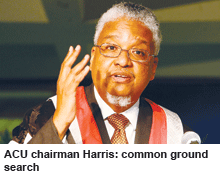In the Caribbean, universities must take on some of the roles discharged by governments in other societies — for example, finding solutions to problems as diverse as gun crime and the preservation of forests. Meanwhile, universities in wealthy nations that see the region only as a source of revenue could stir up resentment.
 These are the views of E. Nigel Harris, vice chancellor of the University of the West Indies (UWI), an institution established under British rule in 1948, originally as an external college of the University of London. Since then, the university has spread across three campuses in Jamaica, Barbados and Trinidad and Tobago, and serves about 46,000 students from 15 countries of the English-speaking Caribbean.
These are the views of E. Nigel Harris, vice chancellor of the University of the West Indies (UWI), an institution established under British rule in 1948, originally as an external college of the University of London. Since then, the university has spread across three campuses in Jamaica, Barbados and Trinidad and Tobago, and serves about 46,000 students from 15 countries of the English-speaking Caribbean.
Harris’ close interest in the role of universities in developing societies was reflected in his election in April as chairman of the Association of Commonwealth Universities (ACU). He wants the ACU to speak up in key debates on the worldwide trend towards higher tuition fees, and to find common ground between universities in the developed and developing worlds.
Harris, who was born in Guyana and obtained a medical degree at the University of Pennsylvania, believes that universities in the developed world should take a partnership approach to international expansion. The aim should be mutually beneficial links in “research and knowledge development” rather than income generation, he says.
One can get a sense of what Harris has in mind by looking at the work being done at UWI. The focus of its research is different from what one might find at a research university in the US or the UK.
The UWI must address the region’s social problems, says Harris, citing issues such as gun crime and other violence, and school dropout rates. “Our thrust is more in the areas of applied research. How do we make a difference to the lives of people in this part of the world? In other countries there are think-tanks that develop such thinking, but in our part of the world the university has taken on that role.”
The mutually beneficial relationships that Harris would like to see between universities in the developed and developing worlds would focus on areas of direct relevance to the latter. This would include health — “HIV/AIDS, some chronic non-communicable diseases such as diabetes” — and helping developing nations “understand more about our flora and fauna, how we protect our seas, islands, and forests”.
(Excerpted and adapted from Times Higher Education)